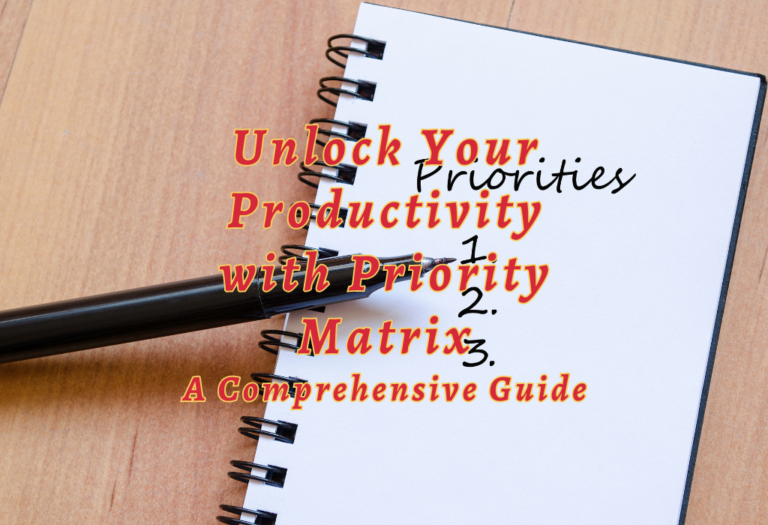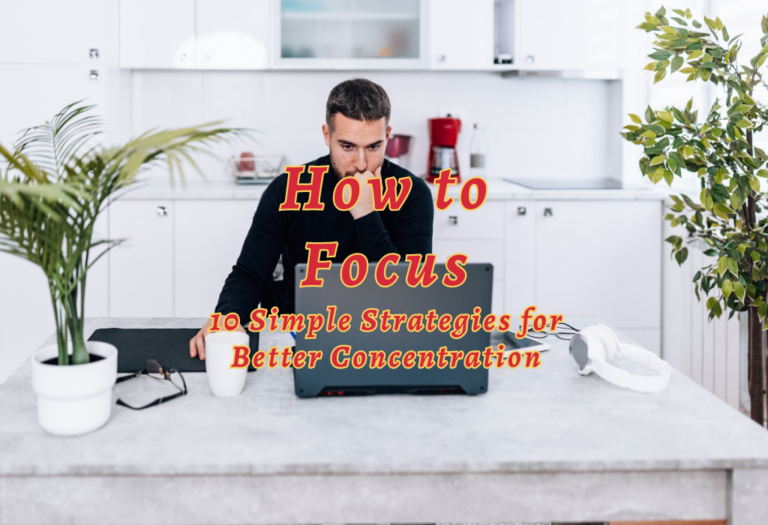10 Simple Habits to Increase Your Productivity Every Day
Everyone is always chasing after productivity – visiting the gym more, meditating more, and so on. But if you feel like you don’t have enough hours in the day to do it all, then you’re probably right!
Lucky for you, we have some simple habits that you can adopt to help you become more productive every day.
From planning tomorrow today to writing out your goals, these ten simple habits will have you feeling more effective than ever and ready to take on the world. So let’s get started!

Setting Goals to Increase Productivity
Setting objectives is necessary for enhancing productivity. Goals aid in prioritizing and structuring work for more efficient management. Short-term, attainable goals can strengthen motivation and involvement with the activity by yielding tangible results. In addition, goal setting provides structure and direction for the tasks that an individual wants to accomplish. These factors contribute to a higher sense of self-efficacy and accomplishment, which can lessen workplace stress.
On the other hand, an excessive emphasis on goal-setting might result in rigidity and tunnel vision when approaching particular jobs. This focus on the final result of work often leads to a lack of originality or risk-taking when completing a project, as clearly defined goals might inhibit inventive problem-solving solutions.
Ultimately, goal planning is essential to enhancing productivity, but it should not come at the expense of innovation and taking risks. Finding a balance between both will result in a stronger sense of accomplishment while permitting individuals to work in an inventive and meaningful manner, resulting in even greater productivity levels.
Now that we’ve discussed goal setting, let’s move on to another crucial strategy for enhancing productivity: job prioritization.
Prioritize Your Tasks
Staying productive is impossible if you don’t prioritize your tasks. To be effective and successful, you need to have an organized approach to your workload. It is important to have a sense of what needs prioritizing as well as a general understanding of what tasks should take priority when you make a to-do list.
Tackling the most important tasks first is key if you want to ensure maximum productivity. Take some time at the start of each day, week or month to think about which tasks are the most important and will require the most effort from your side. These should be placed at the top of your list and prioritized when scheduling your day. You will feel more accomplished when you tick off larger projects, especially if they were high-priority items on your to-do list with an upcoming deadline or difficult task ahead of them.
To determine which tasks are more critical, consider factors such as deadlines, energy levels, the complexity of the undertaking,and the availability of resources. Some charges may not be urgent but should still be higher up on your list than others due to other factors such as their importance to the company or ease of completion. Being aware of these details can help guide you in designing a schedule that maximizes productivity while allowing for life outside work.
The 80/20 Rule
The 80/20 rule, also known as the Pareto Principle, states that 80% of an individual’s results come from 20% of their efforts. By doing this, a person will be able to prioritize and work more effectively. This concept can be applied to any part of life, but it is essential to increase productivity. If a person can identify which tasks are the most important and give them their full attention, it could result in a tremendous increase in productivity.
On the one hand, the 80/20 rule encourages individuals to focus on the most critical tasks while minimizing distractions that would prevent them from reaching their goals. When done correctly, it can help a person become more efficient during their day-to-day activities and achieve maximum productivity. On the other hand, some may argue that focusing too closely on specific tasks can lead to tunnel vision and cause people to miss out on remarkable opportunities or details. Individuals must avoid this extreme focus and remain open to new possibilities to ensure nothing slips through the cracks.
Individuals can significantly increase their productivity daily by understanding and accurately applying the 80/20 rule. That being said, they must stay open-minded and aware of outside opportunities when utilizing this principle. With that said, let’s discuss another simple way to stay productive- Maintaining Focus.
Maintaining Focus
Maintaining focus is essential when it comes to increasing productivity. It can be easily distracted by external stimuli and can quickly cause a person to fall behind with their work. Individuals must learn the importance of getting in the zone and shutting out distractions to stay motivated and effective.
One way to maintain focus is to break down larger tasks and projects into smaller, more manageable chunks. This can help expedite completion since individual components can take less time complete. Additionally, working in blocks—ranging from 30 minutes up to an hour or two at most—will allow individuals to focus intensively on their work without feeling overwhelmed by a long day’s worth of tasks all in one go.
On the other hand, having rigid focus goals limits creativity and may need to be more conducive for those who prefer brainstorming solutions. When breaking down tasks and projects into short but dedicated chunks, some experts say that creative ideas start to dry up once the individual reaches a certain level of exhaustion, which may end up hindering productivity instead of helping it.
Regardless of how someone manages their focus, everyone can agree that taking regular breaks is also vital for maintaining healthy levels of motivation and concentration throughout the day. Taking a few minutes each hour to stretch, eat a snack, chat with a coworker, or just engage in activities not related to work will help reduce overall fatigue while allowing the mind a brief respite from the current task at hand.
Individuals can approach tasks with increased energy levels and efficiency throughout the day by maintaining focus and taking appropriate breaks. In our next section, we will discuss strategies for working at the moment to complete tasks on time and without unnecessary delays or errors.
Working in the Moment
Working in the Moment is an essential aspect of increasing productivity. Being present and focusing on the task in front of you is critical to being more productive. Concentrating on what needs to be done right now keeps us from getting distracted or losing motivation. Additionally, taking frequent breaks every 90 minutes is essential to refresh, re-energize, and gain clarity.
Although working at the moment can provide short-term productivity gains, there are also benefits to long-term planning. For those with larger projects, breaking tasks into manageable steps and setting future deadlines can ensure that progress reaches the intended goals. This way, workers stay focused by having timelines and milestones to meet along the way.
A mindful approach to work helps ensure that tasks are completed efficiently and effectively. Keeping a focused mindset can better prioritize tasks and maintain our energy for maximum productivity. With this balance between staying in the moment and long-term planning, we can improve our daily productivity text; let’s explore how managing time can help us increase our overall productivity.
Managing Time
Managing time successfully is one of the most critical skills for personal and professional productivity. Making progress toward your goals can be challenging without solid time management skills. But how does one go about effectively managing their time?
First, consider what tasks are essential and prioritize those activities in order priority. This means recognizing that some tasks are more urgent than others, such as those with looming deadlines. These are the tasks that should be given the highest priority and tackled first to reach goals as efficiently as possible. Minimize distractions on these essential tasks by turning off notifications or finding a quiet place to focus.
Creating a daily routine can also be a helpful way to optimize productivity and combat procrastination. Building systems, frameworks, and processes will help bring structure and consistency to one’s day. Adhering to pre-determined time constraints can help keep a person on track and motivated to complete tasks within a designated amount of time.
One argument accuses that rigidly structured time management systems stifle creativity or prevent people from using their time to explore interests outside of work-related duties spontaneously. On the flip side, proponents argue that efficient use of allotted time and steadfast adherence to predefined boundaries can allow individuals to create space for creative pursuits while still getting all necessary work accomplished promptly.
Ultimately, balancing allowing flexibility for creative pursuits and productively utilizing scheduled work periods comes down to personal preference and discipline. Whichever approach you decide works best for your lifestyle and workday, effective management of available time is vital for achieving individual productivity goals.
The next step towards increased productivity is understanding the concept of “time blocking,” which we will discuss in the following section…
Time Blocking
Time blocking is an essential tool for increasing productivity. By dedicating a certain amount of time to a specific task, you can better manage your workload and focus on the job. This will also help reduce distractions and give you more clarity to see what needs to be done. Time blocking can be as simple as noting down how much time it takes to complete a task and setting aside that amount to do that task. Or it can be more sophisticated, like breaking down tasks into small blocks on your calendar throughout the day or week.
Time blocking can provide many benefits, including helping improve focus and streamline processes. It can also save time because you allocate reasonable amounts of time for each task and do not waste unnecessary time with less essential functions. However, if it’s not used in moderation, it can become too rigid and overbearing, hurting productivity and overall creativity. For example, if you set overly strict timelines for yourself or dedicate too much time to unimportant tasks, then this will negatively impact your ability to perform efficiently.
Therefore, when using time blocking effectively, try to be flexible with the timing of your tasks and don’t be too rigid when setting deadlines. The following section looks into further detail about creating an efficient environment to maximize productivity.
Creating an Efficient Environment
Having a neat and clean workspace can help to boost your productivity. A cluttered workplace can lead to distraction, frustration, and fatigue. To optimize your workspace for efficiency, ensure that your desk is free of clutter so you can focus solely on the task. Consider organizing all of the necessary materials you’ll need before starting a project- this will further minimize distractions and make it easier to stay on track. Consider investing in organizational tools such as painted jars or boxes to store supplies you use regularly. Working with a positive attitude is equally important when creating an efficient environment. Try playing upbeat music, using energizing scents like peppermint or lemon, or decorating your desk with inspiring artwork.
Creating a comfortable workplace is also essential for increasing productivity. According to research, ergonomic office furniture like tables, chairs, and keyboards designed to reduce stress on the body leads to higher levels of concentration and overall energy throughout the day. Additionally, consider natural lighting or light therapy lamps if needed based on how much time you spend indoors versus outside during daylight hours.
Creating an efficient yet comfortable environment for yourself at work each day will make you more likely to stay focused on your goals and tasks. The next step, then, is to ensure you get enough rest as well.
Get Enough Rest
Getting enough rest is essential to productivity. When you sleep, your body regenerates energy and prepares itself for the next day. A healthy sleep schedule provides a better foundation for success and helps with focus and overall well-being.
On the one hand, research supports that adults should get around seven to nine hours of sleep each night to function optimally during the day. Not getting enough sleep can lead to decreased focus, impaired motor abilities, and even mood disorders. In addition, individuals who lack sleep are at a greater risk of medical conditions such as cardiovascular problems, diabetes, and high blood pressure over time.
On the other hand, there may be benefits to getting less sleep than the average adult. As we age, our sleep cycles naturally decrease; thus some people can operate just fine on five or six hours of sleep and feel energized during their waking hours. But it’s important to note that this amount of hours may only work for some; it varies depending on individual body composition and lifestyle habits.
Ultimately, it’s imperative that adults get enough slumber on a consistent basis to maintain good physical and mental health while being productive during their waking hours. Getting too little or too much sleep can both have negative impacts on how you feel and how you perform throughout the day– it’s all about finding the right balance between rest and action.
Conclusion: With any healthy lifestyle Change comes small but recurring efforts. To increase productivity each day, it is essential to achieve a proper balance between restful periods throughout the day and creative thinking time.
Conclusion
The 10 simple habits outlined in this article have been shown to be effective at boosting productivity, both in the workplace and at home. All of these habits have been proven to work by several studies conducted on working environments – but only if they are consistently implemented. By committing to just a few of these activities each day, you can significantly increase your productivity and reach your goals faster.
On the other hand, it is important to understand that no two people are the same. Everybody has unique preferences, circumstances, and lifestyles which means that not all of these habits will work for everyone. If a certain lifestyle or activity does not seem to be making you more productive for some reason, then try out something else. Don’t be afraid to experiment until you find out what works for you!






